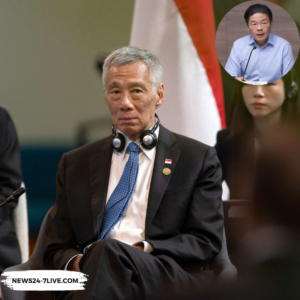After nearly two decades at the Singapore’s government, Prime Minister Lee Hsien Loong has announced his decision to step down on May 15, 2024. His Deputy Prime Minister Lawrence Wong will be sworn in on the same day.

Also Read: Arizona Denounce Revived 1864 Abortion Ban
Lee Hsien Loong ‘s departure comes after a period of uncertainty in succession plans by the COVID-19 pandemic. Deputy Prime Minister Heng Swee Keat was tipped to be the next Prime Minister, but he stepped aside in 2021 leading to a year of deliberation among Singapore’s fourth-generation leaders.
Lawrence Wong emerged as the successor receiving unanimous support from lawmakers. Lee’s tenure as Singapore’s third Prime Minister, from 2004 to 2024, saw many policy changes and economic growth.
Under his leadership, Singapore weathered crises such as the 2008 financial crisis and the COVID-19 pandemic, while also implementing reforms in areas like the Central Provident Fund system and taxation.
Lee Hsien Loong’s stewardship of Singapore’s economy saw growth, with the GDP increasing from S$194 billion in 2004 to over S$600 billion by 2023.
His focus on economic sophistication and global integration propelled Singapore into a leading global city, though challenges such as housing costs and immigration issues led to setbacks in the 2011 General Election.
Lee Hsien Loong prioritized education, expanding pathways for technical education and polytechnics. His vision for Singapore’s development addressed the importance of creating a sense of belonging and a special place for its citizens.
Singapore’s development under Lee’s leadership also saw a change towards providing social safety nets and income inequality.
Measures to address the Gini coefficient and improve healthcare infrastructure were notable achievements.
Also Read: Court Rules Switzerland Violated Human Rights in Climate Case by 2,000 Women
Lee Hsien Loong’s journey to politics took a different route than his early talent in mathematics might have suggested. A distinguished scholar, he chose to return to Singapore to contribute to the nation’s success eventually rising through the ranks in the military before entering politics in 1984.
Lee’s personal life was by the loss of his first wife and remarriage. Anecdotes about his hobbies, such as photography and computer programming, humanized his public image, especially through social media interactions.
Lee Hsien Loong faced challenges including a public feud with his siblings over family matters and allegations of misrepresenting their father’s wishes regarding their family home.
Born in 1952 Lee’s academic prowess was evident from a young age, excelling in mathematics. His educational journey led him to Cambridge University, where he graduated as a Senior Wrangler in the Mathematics Tripos.
Lee chose to redirect his focus towards serving his country, a sense of duty and responsibility towards Singapore’s development.
Lee Hsien Loong’s politics was influenced by his mentor, Emeritus Senior Minister Goh Chok Tong. His early political career saw him rise through the ranks assuming ministerial positions and establishing himself as a figure within the People’s Action Party (PAP).
Lee’s tenure as Prime Minister was by policy initiatives and economic reforms aimed at steering Singapore through various crises and transitions.
Achievements include the Economic Review Committee and overseeing advancements in Singapore’s economy, resulting in exponential GDP growth and global recognition.
Also Read: New Zealand Tightens Visa Rules in Response to Surging Migration






















